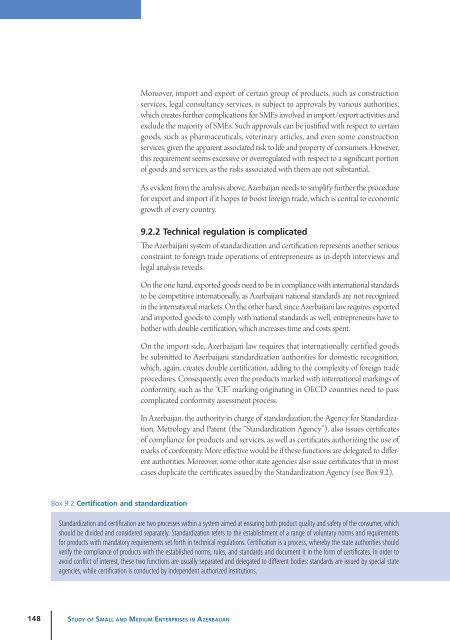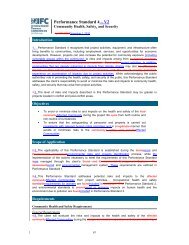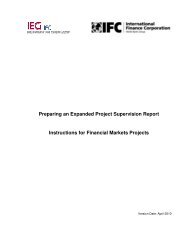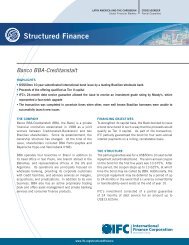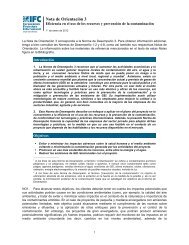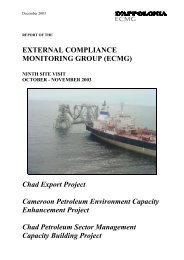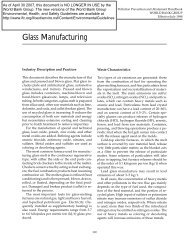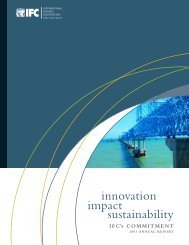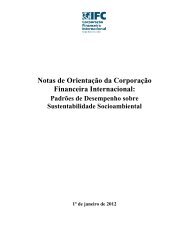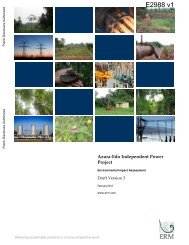Study of Small and Medium Enterprises in Azerbaijan - IFC
Study of Small and Medium Enterprises in Azerbaijan - IFC
Study of Small and Medium Enterprises in Azerbaijan - IFC
You also want an ePaper? Increase the reach of your titles
YUMPU automatically turns print PDFs into web optimized ePapers that Google loves.
Moreover, import <strong>and</strong> export <strong>of</strong> certa<strong>in</strong> group <strong>of</strong> products, such as construction<br />
services, legal consultancy services, is subject to approvals by various authorities,<br />
which creates further complications for SMEs <strong>in</strong>volved <strong>in</strong> import/export activities <strong>and</strong><br />
exclude the majority <strong>of</strong> SMEs. Such approvals can be justified with respect to certa<strong>in</strong><br />
goods, such as pharmaceuticals, veter<strong>in</strong>ary articles, <strong>and</strong> even some construction<br />
services, given the apparent associated risk to life <strong>and</strong> property <strong>of</strong> consumers. However,<br />
this requirement seems excessive or overregulated with respect to a significant portion<br />
<strong>of</strong> goods <strong>and</strong> services, as the risks associated with them are not substantial.<br />
As evident from the analysis above, <strong>Azerbaijan</strong> needs to simplify further the procedure<br />
for export <strong>and</strong> import if it hopes to boost foreign trade, which is central to economic<br />
growth <strong>of</strong> every country.<br />
9.2.2 Technical regulation is complicated<br />
The <strong>Azerbaijan</strong>i system <strong>of</strong> st<strong>and</strong>ardization <strong>and</strong> certification represents another serious<br />
constra<strong>in</strong>t to foreign trade operations <strong>of</strong> entrepreneurs as <strong>in</strong>-depth <strong>in</strong>terviews <strong>and</strong><br />
legal analysis reveals.<br />
On the one h<strong>and</strong>, exported goods need to be <strong>in</strong> compliance with <strong>in</strong>ternational st<strong>and</strong>ards<br />
to be competitive <strong>in</strong>ternationally, as <strong>Azerbaijan</strong>i national st<strong>and</strong>ards are not recognized<br />
<strong>in</strong> the <strong>in</strong>ternational markets. On the other h<strong>and</strong>, s<strong>in</strong>ce <strong>Azerbaijan</strong>i law requires exported<br />
<strong>and</strong> imported goods to comply with national st<strong>and</strong>ards as well, entrepreneurs have to<br />
bother with double certification, which <strong>in</strong>creases time <strong>and</strong> costs spent.<br />
On the import side, <strong>Azerbaijan</strong>i law requires that <strong>in</strong>ternationally certified goods<br />
be submitted to <strong>Azerbaijan</strong>i st<strong>and</strong>ardization authorities for domestic recognition,<br />
which, aga<strong>in</strong>, creates double certification, add<strong>in</strong>g to the complexity <strong>of</strong> foreign trade<br />
procedures. Consequently, even the products marked with <strong>in</strong>ternational mark<strong>in</strong>gs <strong>of</strong><br />
conformity, such as the “CE” mark<strong>in</strong>g orig<strong>in</strong>at<strong>in</strong>g <strong>in</strong> OECD countries need to pass<br />
complicated conformity assessment process.<br />
In <strong>Azerbaijan</strong>, the authority <strong>in</strong> charge <strong>of</strong> st<strong>and</strong>ardization, the Agency for St<strong>and</strong>ardization,<br />
Metrology <strong>and</strong> Patent (the “St<strong>and</strong>ardization Agency”), also issues certificates<br />
<strong>of</strong> compliance for products <strong>and</strong> services, as well as certificates authoriz<strong>in</strong>g the use <strong>of</strong><br />
marks <strong>of</strong> conformity. More effective would be if these functions are delegated to different<br />
authorities. Moreover, some other state agencies also issue certificates that <strong>in</strong> most<br />
cases duplicate the certificates issued by the St<strong>and</strong>ardization Agency (see Box 9.2).<br />
Box 9.2 Certification <strong>and</strong> st<strong>and</strong>ardization<br />
St<strong>and</strong>ardization <strong>and</strong> certification are two processes with<strong>in</strong> a system aimed at ensur<strong>in</strong>g both product quality <strong>and</strong> safety <strong>of</strong> the consumer, which<br />
should be divided <strong>and</strong> considered separately. St<strong>and</strong>ardization refers to the establishment <strong>of</strong> a range <strong>of</strong> voluntary norms <strong>and</strong> requirements<br />
for products with m<strong>and</strong>atory requirements set forth <strong>in</strong> technical regulations. Certification is a process, whereby the state authorities should<br />
verify the compliance <strong>of</strong> products with the established norms, rules, <strong>and</strong> st<strong>and</strong>ards <strong>and</strong> document it <strong>in</strong> the form <strong>of</strong> certificates. In order to<br />
avoid conflict <strong>of</strong> <strong>in</strong>terest, these two functions are usually separated <strong>and</strong> delegated to different bodies: st<strong>and</strong>ards are issued by special state<br />
agencies, while certification is conducted by <strong>in</strong>dependent authorized <strong>in</strong>stitutions.<br />
148<br />
St u d y o f Sma l l a n d Me d i u m Ent e r p r i s es <strong>in</strong> Az e r b a i j a n


